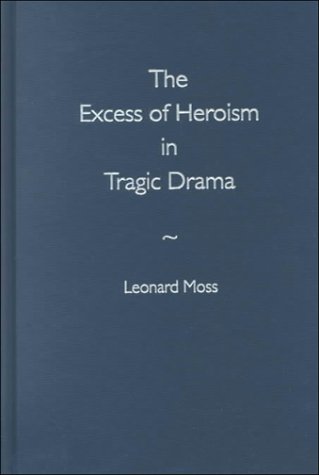Items related to The Excess of Heroism in Tragic Drama

"Many technical studies within classics or comp lit make one feel inferior, lacking in the requisite languages or critical grammar. Moss's work, to the contrary, gives the intelligent reader all that is necessary."--William G. Doty, Auburn University The Excess of Heroism in Tragic Drama is a critical study of what makes tragedy tragic. Leonard Moss seeks an answer in his readings of three seminal philosophers of tragedy: Plato, Hegel, and Nietzsche. He then takes the subject a step farther by directly applying their different philosophical approaches to the underlying ethical contradictions operating in tragedy, as well as to the technical resources of tragic drama. Discussing tragic elements of major works from the Greeks to Shakespeare to Kafka and outlining the continuities that link them through time, Moss claims that protagonists normally display stereotypical attributes of masculinity or femininity that ultimately lead to their undoing. Principal figures in tragic dramas of classical Athens are seen as victims of a profound egoism that distorts their idealized image with self-pity, anxiety, and wrath. Shakespeare's noblest characters, too, turn themselves into victims of an intense fixation on power and perfection. According to Moss, Shakespeare and the Athenians were delivering a radical critique of their respective cultures' notions about human excellence; they were playing variations on a single theme. The tragic hero doesn't only self-destruct, he or she personifies the inconsistency of an entire value system. Moss connects this theory to specific literary techniques to describe how ethical considerations are embodied in the images, narrative format, and rhetoric fashioned by great tragedians. Leonard Moss, professor emeritus of comparative literature at the State University of New York at Geneseo, currently edits the journal of the Rhode Island Jewish Historical Association in Providence. He is the author of Arthur Miller and of many articles on tragic drama.
"synopsis" may belong to another edition of this title.
Synopsis:
A critical study of what makes tragedy tragic. Leonard Moss seeks an answer in his readings of three seminal philosophers of tragedy: Plato, Hegel and Nietzsche. He then takes the subject a step further by applying their different approaches to the ethical contradictions operating in tragedy.
"About this title" may belong to another edition of this title.
- PublisherUniversity Press of Florida
- Publication date2000
- ISBN 10 0813017599
- ISBN 13 9780813017594
- BindingHardcover
- Number of pages256
£ 9.52
Shipping:
£ 4.82
Within U.S.A.
Top Search Results from the AbeBooks Marketplace
The Excess of Heroism in Tragic Drama
Published by
University Press of Florida
(2000)
ISBN 10: 0813017599
ISBN 13: 9780813017594
Used
Hardcover
Quantity: 1
Seller:
Rating
Book Description Hardcover. Condition: Very Good. Very Good - Crisp, clean, unread book with some shelfwear/edgewear, may have a remainder mark - NICE Standard-sized. Seller Inventory # M0813017599Z2
Buy Used
£ 9.52
Convert currency
The Excess of Heroism in Tragic Drama
Published by
University Press of Florida
(2000)
ISBN 10: 0813017599
ISBN 13: 9780813017594
Used
Hardcover
Quantity: 1
Seller:
Rating
Book Description Hardcover. Condition: Good. No Jacket. Approx 4 pages have pencil markings ow text is solid & bright 240 pages. Seller Inventory # 515555
Buy Used
£ 4.80
Convert currency

